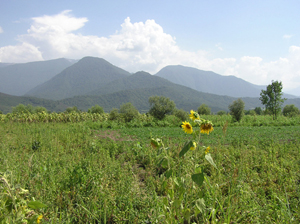Roger Ainslie, Jebrael Nokandeh, Hamid Omrani Rekavandi, Eberhard Sauer, Tony Wilkinson, Chris Oatley, Mohammad Ershadi, 2014
A joint AHRC-funded fieldwork project by the Iranian Cultural Heritage, Handcraft and Tourism Organisation, the Iranian Center for Archaeological Research and the Universities of Edinburgh and Durham (2005-2009).
Project by Hamid Omrani Rekavandi, Eberhard Sauer, Jebrael Nokandeh, Tony Wilkinson et al., 2010
Geophysical Survey by Roger Ainslie, Chris Oatley, Mohammad Ershadi et al..
place within their strategic and landscape context the Gorgan and Tamishe Walls in NE Iran. At 195 km length the Gorgan Wall forms the longest continuous ancient linear barrier between the German Limes and the Chinese linear earthworks. The construction of a major defensive barrier, apparently in conjunction with canals, dams and reservoirs, was a massive feat of hydraulic engineering. By describing and dating these features the project has shed considerable light on the administration and deployment of power within the Sasanian Empire.
Please note that the reports on this website are all preliminary, and thus should not necessarily be relied upon, as some of our interpretation of the results have changed since. The primary purpose of the depository is to provide access to supplementary images and data, for which there was no space in our final report, not to provide the ultimate interpretation. We recommend that you consult also the final report and do not rely on the accuracy of information in the depository. The bibliographical details of the final report, which is unfortunately only available in print, are as follows:
Sauer, E.W., Omrani Rekavandi, H., Wilkinson, T.J., Nokandeh, J. et al., 2013. Persia's Imperial Power in Late Antiquity: the Great Wall of Gorgan and Frontier Landscapes of Sasanian Iran. A joint fieldwork project by the Iranian Cultural Heritage, Handcraft and Tourism Organisation, the Iranian Center for Archaeological Research and the Universities of Edinburgh and Durham (2005-2009). British Institute of Persian Studies Archaeological Monographs Series II, Oxford: Oxbow Books, pp. xvi + 712 [ISBN 978-1-84217-519-4].










 Stumble It!
Stumble It!

No comments:
Post a Comment